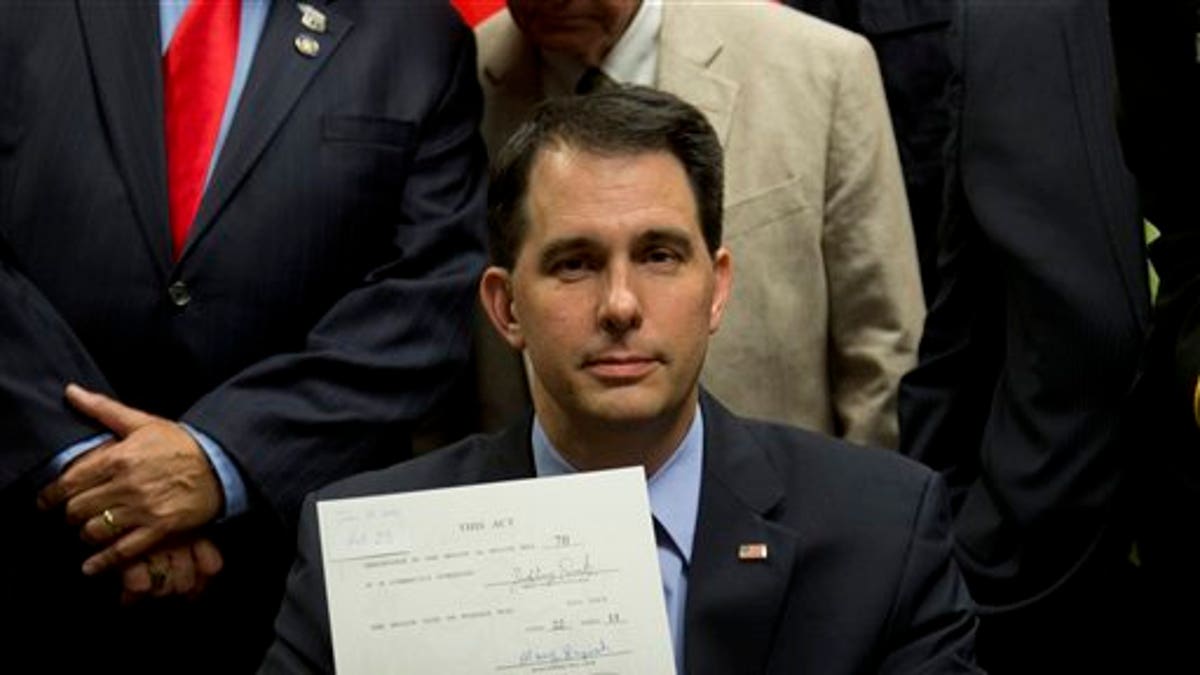
FILE -- June. 24, 2015: Wisconsin Gov. Scott Walker holds up a bill after signing it at the Milwaukee County Sheriff's office that eliminates a 48-hour waiting period for handgun purchases. (AP Photo/Jeffrey Phelps)
“Anti-worker.”
“Hates Americans.”
“Domestic terrorist.”
That’s the PG-version of the rhetoric Wisconsin Governor Scott Walker’s political opponents used to make the case against him.
While Walker is no stranger to fierce political combat, such name-calling coarsens the public policy debate and does a disservice to voters.
Using heavy-handed labels as political rhetoric is a time-honored American tradition. When we discuss politics, people often take shortcuts. Some reflexively frame any labor-related reforms as “anti-worker” while others call those same reforms “pro-taxpayer.” Even less hostile labels—“Left versus Right,” or the media favorite “Blue versus Red”— fail to advance meaningful debate.
Lost in this superficial label shuffle are real insights into the underlying, and meaningful, issues. Indeed, it seems that hyperbole is the refuge of those with weak arguments. At a time when our nation faces challenges of historic proportion, more substance and less rhetoric is surely a good idea.
For example, four months ago, Governor Walker made Wisconsin the twenty-fifth right-to-work state, signing a bill ending forced unionization. President Obama termed this common sense—and increasingly commonplace—policy change “anti-worker” and said at the time that Walker’s efforts were part of a“sustained, coordinated assault on unions.” (The name calling from the White House hasn’t stopped. Indeed, President Obama traveled to LaCrosse, Wisconsin two weeks to “double down” on his misguided criticisms of Governor Walker.) All this over a law that provides more freedom for workers.
Anyone who believes that Governor Walker views attacking unions as an end in itself know little of the governor or his record.
Before signing right-to-work into law, Walker faced an epic showdown with the public-sector unions over his 2011 proposal to fix the state’s budget mess. At the time, the state faced a $3.6 billion deficit, because generations of politicians made promises to government workers that could not be sustained. Without action, substantial layoffs of public-service employees were all but guaranteed. Instead of chasing ever-higher spending with tax increases, Walker forged a more sensible solution. He thoughtfully redefined organized labor’s relationship with state, municipal, and local governments.
Act 10 had several key elements:
?It empowered local governments and school districts to bid out to get the best deal for benefits on the open market – something that was virtually impossible under the state’s collective bargaining structure.
?It required public-sector union members to contribute 5.8 percent of their salaries toward their retirement (they had previously contributed nothing) and cover 12.6 percent of their health insurance premiums—still far less than the average benefit contributions for private-sector employees.
?It ended the practice of the state automatically collecting union dues on behalf of unions, letting workers choose whether they want to pay to belong to a union.
Passage of Act 10 was possible because of Wisconsin’s dire financial predicament. Walker not only made the math work, but made Wisconsin’s educational system and labor arrangements better in the process.
By questioning Walker’s motives as “anti-union,” his political opposition ignores the fact that the reforms worked. Walker advanced his twin goals of job creation and more effective government:
?Wisconsin turn a $3.6 billion budget deficit to a nearly $1 billion surplusWisconsin turned a $3.6 fiscal shortfall to a nearly billion dollar surplus;
?The state’s unemployment rate has dropped from 8.1 percent to 4.6 percent; and
?Wisconsin balanced its budget without raising taxes, and the state’s pension fund is the only one in the nation that is fully-funded.
Walker’s reforms avoided layoffs and created flexibility for local governments to make smarter decisions about the use of tax dollars, unimpeded by a rigid collective bargaining framework that was out of step with reality.
All leaders who enter the public arena—and who challenge the status quo—subject themselves to vitriol.
As we begin another campaign cycle, we have an opportunity to elevate the debate. It is our hope that we can do better as a nation, and as Abraham Lincoln encouraged in his first inaugural address, act in accordance with “the better angels of our nature.”
With our nation saddled with $18.2 trillion in debt and baby boomers retiring, the federal government is on an unsustainable path. The solution isn’t going to be easy, and will—at a minimum—require us to focus on substance, not sound bites. In the case of Scott Walker, there’s real substance to consider.
J. Joe Ricketts and Todd M. Ricketts are the Chairman and CEO, respectively, of Ending Spending, a non-profit, government reform advocacy group.




















